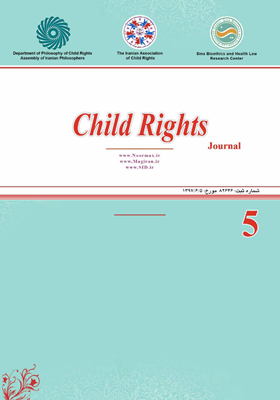Iran's penal policy towards providing security for children in cyberspace
Subject Areas : child rightsSeyed Abbas Khalilpour Chalkiasari 1
1 - PhD in Criminal Law and Criminology, Islamic Azad University of Lahijan, Department of Criminal Law and Criminology, Lahijan, Iran
Keywords: Cyberspace, Children, Security, Criminal Law, Legislative Policy ,
Abstract :
The astonishing advancement of information technology in the early years of the twenty-first century has brought about countless changes in the various fields and opened another door to the new world so that all human economic, social, political, cultural and scientific activities are fundamentally changed. Law is also a branch of the humanities that regulates human relations in the context of collective life. It has developed laws to prevent children from unsecured entering the virtual world and legal measures to protect them. Adopting a distinct approach to the substantive criminal law of cybercrime can minimize harm to children and adolescents by prevention. In the meantime, questions and doubts have been raised about the limits of freedom of use of the Internet for children, the limits of free flow of information against child users, protection of child privacy in cyberspace and finally the role of legal regulations to protect this vulnerable group that easily can be exploited in this boundless world. In this research, through data collection tools and using library and internet resources with rational analysis of the content to study the legislative policy of criminal law on criminal security for children in cyberspace, in comparison with the iranian legal system and international documents, in order to better confront and prevent these crimes, the issues and problems and the strengths and weaknesses of the enacted laws are presented and suggestions and solutions for solving these problems are discussed.
1. Shirzad K. Computer Crimes from the Perspective of Iranian Criminal Law and International Law. Tehran: Behine Publications; 2009. p.4.
2. Analysis of various types of cyber crimes, by Hassoun Y. No. 26, October and November 2010.
3. Farahani Jalali A H. An Introduction to the Criminal Procedure Code of Cybercrime. Tehran: Khorsandi Publications; 1998. p.1.
4. Hosseini B. Cybercrime against Children and its Criminological Fields. First Edition.Tehran: Afraz Publications; 2004.
5. Nemati Z. Pornography with a look at the law on how to punish persons who engage in illegal activities in audio-visual matters. Master's Thesis. Tehran: University of Tehran - Faculty of Law and Political Science; 2010.
6. Rezaie M, Babazadeh Moghadam H. Principles of Law and Regulation for the Internet with Emphasis on UNESCO and Council of Europe Resolutions. Quarterly Journal of Public Law Research 2014; 15(4): 43-82.
7. Ghannad F, Akbari M. Securityism of Criminal Policy. Criminal Law Research 2017; 5(18): 39-67.
8. Norris G, Lincoln R, Wilson P. Contemporary comment: An examination of Australian internet hate sites. Bond University. 2005.
9. Zamani G, Bahramlo M. [Translation of Human rights and the Internet]. Hick S, Halpin E, Hoskins E.(editors). Tehran: Khorsandi Publications; 2006.
10. Rezaee A. Electronic Commercial Law. Tehran: Mizan Legal Foundation; 2009.
11. Hasan Baigi E. law and Security in Cyberspace. Cultural Institution of International Studies and Researches. Abrar Moaser; 2005.
12. Kamal A. The Law of Cyber-Space, An Invitation to the Table of Negotiations. Published by United Nations Institute for Training and Research; 2005.
13. Omidi M. Iran ICT Newes. 2010; Available at: https://www.ictna.ir/
14. Stuart BI. Beyond our control? Confronting the limits of our legal system in the age of cyberspace; 2001.
15. Vacca JR. Computer forensics: computer crime scene investigation. Hingham, MA: Charles River Media; 2005.
16. Kamal A. The Law of Cyber-Space, An Invitation to the Table of Negotiations. Published by United Nations Institute for Training and Research; 2005.
17. Brancik K. Insider computer fraud: an in-depth framework for detecting and defending against insider IT attacks. Auerbach Publication; 2008.
18. Williams M. Virtually criminal: Crime, deviance and regulation online. London: Routledge; 2006.
19. InfoTech. Computer Crime Prevention Law. Access on: How countries handle computer crime. Ethics and Law on the Electronic Frontier; 2010.
20. Walden I. Computer crimes and digital investigations. Oxford: Oxford University Press, Inc.; 2007.
21. Casey E. Digital evidence and computer crime: Forensic science, computers, and the internet. Academic press; 2011.
22. Carroll JM. Computer security. Butterworth-Heinemann; 2014.


